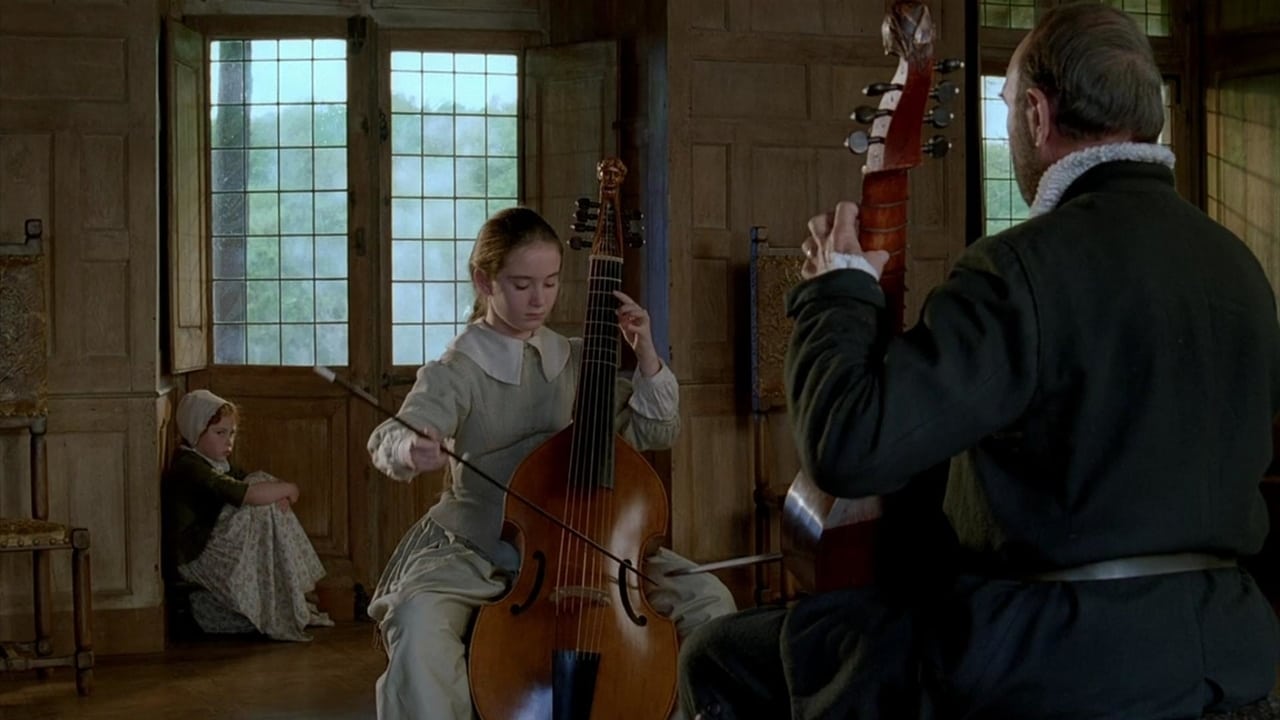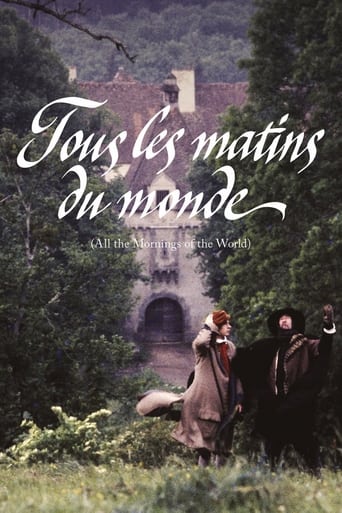

This film consists of the memories of the famous musician, Marin Marais (Gerard Depardieu), reminiscing about an even greater musician, Monsieur de Sainte Colombe. Now understand, these were real French musicians from the 17th and 18th century, but apparently very, very little is known about Colombe and the story is from a novel consisting of lots of conjecture by Pascal Quignard...so don't accept this as the gospel!Monsieur de Sainte Colombe (Jean-Pierre Marielle) is a very strange man--an angry weirdo, certainly. His wife died young and unexpectedly and his reaction is odd to say the least. He gave up his work and retreated to his shabby country home with his two young daughters. The home is a rather joyless place though he eventually taught his daughters to play the Viol de Gambon...a seven-stringed musical instrument popular during this era. Over time, they became brilliant at playing and they established quite the reputation...so much so that he is invited to court to play for King Louis XIV. But he is an oddball and so he steadfastly refuses...only playing a yearly concert for locals and otherwise living his simple life. Into this very mundane world comes a young Marin Marais (played here by Gerard's real life son, Guillaume). He begs Colombe to take him on as a student...something he never did before, aside from teaching his two daughters. And, briefly they work together though it ultimately ends in tragedy...and what that is you'll just have to see for yourself.If you are wanting to see a happy and uplifting movie, this is NOT for you. Much of the film is very somber and depressing, though the music is also quite lovely. However, it is well made though I am apprehensive to heartily recommend it for two reasons. First, it's not exactly a fun film and is incredibly somber...and some may now want to see such a movie. Second, the film does much to make Marais look like a total jerk...and is that hardly fair to the man's memory considering the story is essentially fiction??
... View MoreA person wishing to see the stamp that imposture, venality, perfidy and lies put on a human face should only watch French historical dramas. Corrupt sybarites tiptoe around royal courts, wheezing under the weight of their wigs and lifestyles. Theirs are faces that sag with a permanent combination of distaste and craving; their very eyes can seduce and pollute with a single glance.This is one of the faces we see, in a long close-up, as the opening shot of this movie. Marin Marais is a greatly respected musician at the King's court, but he's seen better days, and dozes fitfully while his viola students argue about technique. He wakes and critiques every one of them pitilessly, then turns the lash upon himself. He tells them of a life spent in self-aware mediocrity next to an artist who possesses a purity and passion that can't be learned.This man is Marais's teacher – a fictionalized version of 17th-century musician Monsieur de Sainte-Colombe, who wrote great music for the viola. His beloved wife dies of an illness while he's entertaining nobility. Sainte-Colombe returns home, looks at her body and walks out of society with his two young daughters. They live cold and silent lives in the countryside, until a young man shows up for an apprenticeship and won't leave. He's capable enough on the instrument, but does he have the soul of an artist? Sainte-Colombe decides to teach him.The master doesn't speak in comprehensible sentences. The metaphors that make up his speech are disjointed dabs of emotion and color, like flat projections of an immeasurable and many-dimensional shape. His disciple certainly doesn't understand them, and has no adequate response. For Sainte-Colombe, words are a paltry and clumsy thing; music is the only way to express the ineffable – endless grief, impossible to describe, impossible to write about, impossible to film, finds an outlet in music. His bow cries and tears across the strings, and all the world's sorrow pours out. There's a good reason this soundtrack became one of France's best-sellers. Marin Marais is played first by Gerard Depardieu's son, and as he grows from a limber young man into a fat and powdered courtier, by Depardieu himself. He sincerely wants to live up to his master, but there are so many girls to chase, so many ladders to climb. He is a man of quick and shallow passions, and once he moves on, his old attachments become nothing but mild embarrassments. He is not an evil man, but his indifferent cruelty ends up leading to appallingly tragic results. "He didn't want to be a shoemaker" is one of the most heart-rending lines I've ever heard. In the end, which is the film's beginning, Marais is left with a life spent in pursuit of easy applause, asking his master's ghost for forgiveness.Tous les Matins du Monde is a rare film – capable of drawing us into a different consciousness, and helping us understand and appreciate something we had never contemplated before. It's a torrent of music and feeling, and there are no protective walls of irony around it. Whether you're interested in Baroque music, or merely the power of cinema, this one is worth seeing.
... View MoreThe beautiful, Barry Lyndon-like sheen of Tous Les Matins du Monde is at odds with its sour characters and melodramatic plot. Despite an end that makes overtures to archetypes and to epic creation, watching Matins proves a tedious experience.Set in the late 1600s, Matins revolves around four characters. The leader of the pack is Monsieur de Saint Colombe, a gruff middle-aged widower with a grand total of two interests: music (he plays the viola) and the memory of his late wife. He lives on an estate in the country with two daughters whom he consistently neglects; the estate keeps up appearances without his supervision.The family gains renown for its musical abilities when his two daughters eventually join him in plucking at stringed instruments. There is, for a time, nothing but music and family and the green of the countryside. This Rousseauian idyll is poisoned when a strapping, blonde-haired young manalas, a city urchin! asks de Saint Colombe to teach him about music. The young man is more interested in revenge than music, in getting to where he needs to go than the hearts he has to break along the way.Writers Pascal Quignard and Alain Corneau (the film is directed by Corneau) thrust de Saint Colombe on viewers out of the apparent belief that a great artist must be cruel, oafish, unknown and unhappy. They make sure that two long-suffering women are present: de Saint Colombe's daughters accept his awfulness without humor or challenge. Of course, were his daughters to challenge de Saint Colombe, Quignard and Corneau would run the risk of developing something more complex than they're interested in making here.While the people get uglier, the countryside stays pretty, thanks to the film's gorgeous lighting and Yves Angelo's photography. The final scenes pull from the dark shadows and golden light of late Rembrandt, and from John Alcott's work on Barry Lyndon. The costumes are lovely, the estate seems appropriately large and cold, and several of the performances are played with conviction.There's memorable style here, but no substance to match it.
... View MoreFirst things first, this is a film very much about music, so if you do not like "classical" music, then find something else. It is something like a short philosophy of music according to M. de St. Colombe and Marin Marais, two very different composers---how close the movie is to the "real" St. Colombe and Marias, confessedly, I do not know, but this is not a documentary, so it really does not matter. There is also a very beautiful exploration of love and its various manifestations in friendship, parenthood, and sexual relations. The movie is heavy, burdened by sadness and melancholy; but it is a beautiful film and worth viewing so long as you are prepared for its weight. Its tones are elegiac, autumnal, meditative, and inward, as is the haunting music given us by Jordi Savall and co. The acting, sets, and cinematography are all excellent (hence the 10 rating). If you want something light then this is not the film for you; if you are, however, in a mood for a film that mourns with dignity, then you have found the right one.
... View More